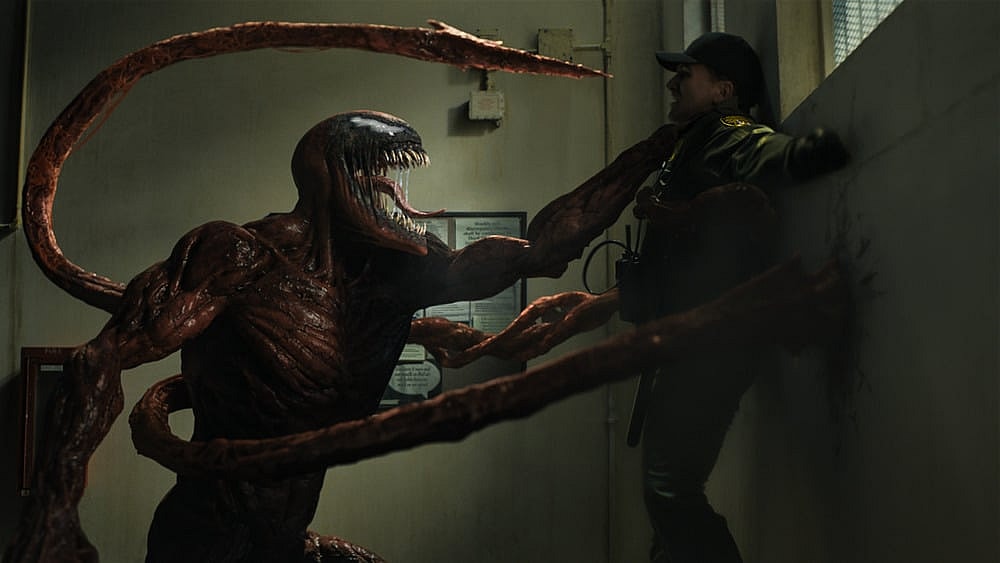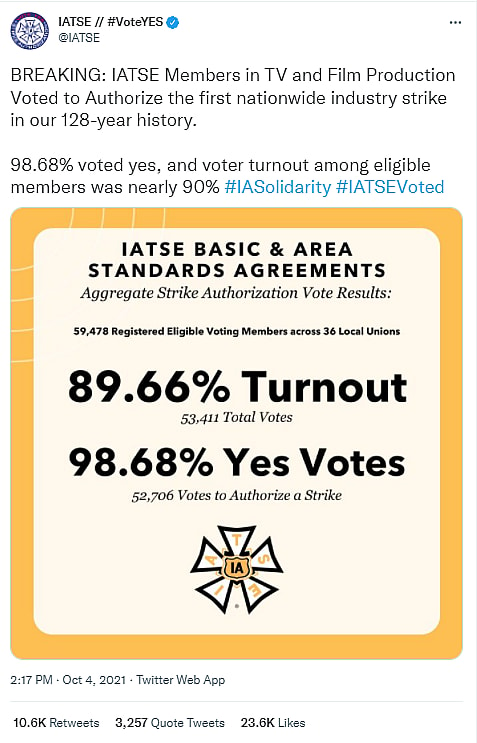IATSE Union Authorizes Nationwide Strike Amidst Dispute With Alliance Of Motion Picture And Television Producers

The International Alliance of Theatrical Stage Employees, Moving Pictures Technicians, Artists and Allied Crafts of the United States, Its Territories and Canada (IATSE) authorized a nationwide strike amidst a dispute with the Alliance of Motion Picture and Television Producers (AMPTP).
IATSE is made up of more than 360 Local Unions throughout the United States and Canada. The local unions are broken up into 13 different geographical regions in the U.S. and Canada.

On Twitter the union announced, “IATSE Members in TV and Film Production Voted to Authorize the first nationwide industry strike in our 128-year history.”
They added, “98.68% voted yes, and voter turnout among eligible members was nearly 90%.”

The Motion Picture and Television Production Department of IATSE notes their members “build the sets, design the clothing, frame the image, record the dialogue, edit the scenes, animate the characters, and yes, even create weather to help bring a story to life.”
According to a press release from the union, more than 60,000 members overwhelmingly voted “to grant the IATSE International President Matthew Loeb authority to call a strike.”
“The members have spoken loud and clear,” said Loeb. “This vote is about the quality of life as well as the health and safety of those who work in the film and television industry. Our people have basic human needs like time for meal breaks, adequate sleep, and a weekend. For those at the bottom of the pay scale, they deserve nothing less than a living wage.”
He added, “I hope that the studios will see and understand the resolve of our members. The ball is in their court. If they want to avoid a strike, they will return to the bargaining table and make us a reasonable offer.”

According to the Los Angeles Times, the dispute between IATSE and the AMPTP is over pay, health and pension plans, improved rest periods and meal breaks, and a larger cut of the profits from streaming platforms.
Loeb told the LA Times, “We really have four points that are hanging [out] there, and a few other issues that I think will be dealt with, but you’re talking about meals and breaks during the day; rest periods between shifts and on the weekends; a living wage for the lowest-paid people; and some appropriate adjustments to new media [streaming] based on its maturity.”
He added, “The rest periods and the quality of life issues, including the meals and the breaks, are clearly getting a lot of momentum, but I would not diminish the importance of the other issues I mentioned — they are all priorities.”

According to Deadline, AMPTP released saying they remain “committed to reaching an agreement that will keep the industry working.”
“We deeply value our IATSE crew members and are committed to working with them to avoid shutting down the industry at such a pivotal time, particularly since the industry is still recovering from the economic fallout from the Covid-19 pandemic,” the group added.
The statement concluded, “A deal can be made at the bargaining table, but it will require both parties working together in good faith with a willingness to compromise and to explore new solutions to resolve the open issues.”

Before the vote authorizing the strike, Loeb was asked by the LA Times on the likelihood of a strike actually happening.
He responded, “That depends largely on the employers and what they’re prepared to do to avoid it. They’ve made it about power, not reason, so my read is that if they see that the strike authorization is passed, then maybe they will return to reason and the bargaining table. But if it’s about power, that’s a problem.”
He also noted, “We’re getting support from a lot of people. They recognize there are issues. There are a lot of people supporting us; that might seem like a surprise. People who are in production, people who run productions and manage them, people who are able to produce within the confines of humane work rules. I suspect there’re reasonable people in [the AMPTP] and so there’s hope.”

As for a timeline on when a strike might happen, Loeb said, “[We will] approach the producers after the strike vote is returned and inform them of the results and see if they’re ready to get back to the table, and then we’ll decide about the timeline.”
What do you make of this movie by IATSE? Do you see a strike in Hollywood’s future?
